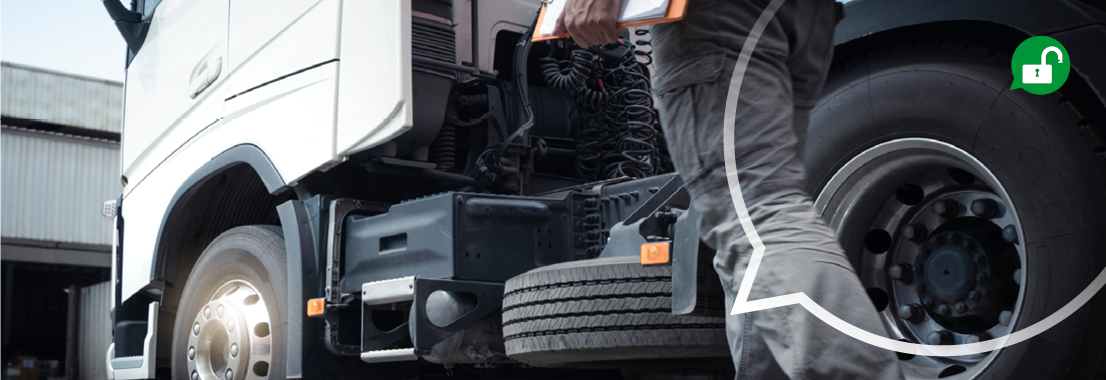
Safe driver, safe vehicle, safe load:
getting it right every time
Safe driver, safe vehicle, safe load:
getting it right every time
Dr Karen McDonnell, our Occupational Health and Safety Policy Adviser and Head of RoSPA Scotland, highlights the importance of transporting goods safely.
Occupational road safety does not start and stop on the way out of a construction site or as materials leave a depot to be delivered to homes and workplaces. It starts as soon as each of us thinks about driving for work – every day.
The world’s roads are a shared space. In cities, towns or rural areas, vehicles driven for work take to the road alongside others, including cyclists and pedestrians. And while safety is a shared responsibility, inevitably the drivers of vehicles transporting loads to or from places of work have “greater power and as a consequence greater responsibility” towards other road users, especially those that are vulnerable.
Understanding the layers of responsibility, both personally and organisationally, that keep people safe on the world’s roads is central to our success in reducing these risks.
Each driver sitting behind a steering wheel has made a decision about their personal fitness to drive, whether it is to work or for work. Every day, businesses and organisations make road safety-related decisions – putting systems in place for checking in with drivers, ensuring loads are secured, undertaking vehicle checks, planning delivery routes and putting contingency plans in place to cover any emergencies.
Getting loading wrong can lead to spilled loads, causing delay and congestion that impacts on all road users and magnifies the challenge for those who drive for work. Unsecured loads can shift and become difficult to unload, with the potential to fall on people. If there is insufficient time for unloading, the opportunity for drivers and those assisting with unloading becomes pressurised and the time to stop and think evaporates, putting people at risk.
Unsafe loads on vehicles injure more than 1,200 people a year and cost UK business millions of pounds in damaged goods. Proactive approaches to vehicle loading and unloading can save lives and prevent disruption and delays. Getting vehicle loading right every day, following a safe systems approach, embeds a discipline that significantly reduces the likelihood of something going wrong
Think about how you can apply basic principles of loading and unloading to all types of vehicles. From your family car when preparing to go on holiday to loading an HGV or LGV, these principles can save lives.
As with every safety-related task, planning underpins success. Good safety practices include loading to bulkheads, evenly distributing the load, ensuring it is stable and securing the load to the vehicle or trailer. It all sounds straightforward enough but just where are the legal responsibilities?
Within a UK context, when transporting goods and materials for work everyone in the transport chain has a responsibility. From the person or company who loads the vehicle, to the vehicle operator and the drivers themselves, within this chain there is a shared responsibility to carry out the transport operation from start to finish in a safe and legal manner.
A blend of road safety and OSH legislation is there to guide businesses to get this right. In the UK these core principles are fundamental in ensuring that no one is harmed as a consequence of transporting goods for work. We should always try to visualise the people and families behind the statistics we use to assess performance improvement and remember that every casualty is a person with their own unique story.
The word “checklist” within the OSH world often has a negative connotation, suggesting a “tick box” approach to managing health and safety, where in fact the definition of the word suggests quite the opposite – “a list of items required, things to be done, or points to be considered, used as a reminder”. A reminder not only that health and safety, encompassing road safety, is a business benefit, not a business burden, but also a reminder to:
- Assess the risks of transport activities and plan how these will be controlled
- Provide appropriate equipment and training to workers
- Provide information so that drivers can be sure their load is safe.
RoSPA is responsible for the delivery of the Scottish Occupational Road Safety Alliance (ScORSA), an initiative relating to those who drive or ride for work. Membership is free and is open to individuals and organisations worldwide. Member benefits include a webinar series, road safety podcasts and access to information that helps manage driving risk. www.scorsa.org.uk
Dr Karen McDonnell is RoSPA's Occupational Safety and Health Adviser and Head of RoSPA Scotland. A Past President of IOSH, Karen represents RoSPA on The Sleep Charity Advisory Board, the Council for Work and Health and the International Network of Safety and Health Practitioner Organisations.
Already a member? Login to MyRoSPA to read more articles

Login to you MyRoSPA account
Login to MyRoSPA to view exclusive member content
Login
| Join RoSPA
Become a member now
Become a member to access MyRoSPA to view more exclusive content
Join
Already a member? Login to MyRoSPA to read more articles

Login to you MyRoSPA account
Login to MyRoSPA to view some more exclusive content
Login
| Join RoSPA
Become a member now
Become a part of the MyRoSPA team to view more exclusive content
Register